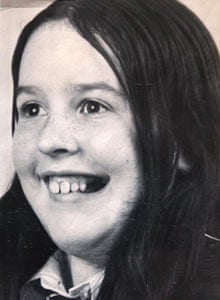
Majella O'Hare was 12 years old. It was a bright summer's day in 1976 and the schoolgirl had just walked past an army checkpoint on the way to church. Moments later, she lay dying on a country road in County Armagh, shot in the back by a paratrooper.
Now, almost 35 years after the infamous killing, an unprecedented apology from the Ministry of Defence will be handed over to her elderly mother at a ceremony in Belfast.
The letter, signed by the defence secretary, Liam Fox, belatedly corrects the army's account of the incident and acknowledges that the soldier's subsequent courtroom explanation was "unlikely".
British Irish Rights Watch, a civil liberties group that has campaigned for decades for a formal apology, welcomed the statement and hoped that it would open the way for a more conciliatory approach by military officials.
The only other occasion an apology has been offered for the army's behaviour during Northern Ireland's Troubles – albeit in more general terms – was after publication of the Bloody Sunday Inquiry last summer. Then, David Cameron described the Parachute Regiment's actions in Derry as "unjustified and unjustifiable".
The death of Majella O'Hare followed a spate of sectarian murders in south Armagh. It was 14 August 1976 and she had set off for confession with some school friends.
"They came upon an army patrol," her brother Michael, now 62, told the Guardian. "She had walked on about 20 or 30 yards when [shots] rang out from a general purpose machine gun. Three shells were found on the ground. Two bullets hit her in the back.
"The soldier [Private Michael Williams] was carrying the weapon cocked and ready but he would have had to exert between 10 and 12lb of pressure to fire it.
"My father was the school caretaker and he had been outside cutting the grass and tidying up. He heard shots. There was panic; he know something terrible had happened and ran to the scene.
"The soldiers were giving him abuse, shouting: 'What do you think you are doing? You're only the fucking grass-cutter.' Even after he found her on the road and cradled her in his arms, they were abusive."
Majella was airlifted to Daisy Hill hospital but died in the military helicopter.
Williams, of the 3rd Battalion Parachute Regiment, claimed he had fired in response to an IRA sniper attack. The RUC investigated and the paratrooper was charged with murder.
By the time of the trial, the charge had been reduced to manslaughter. Lord Justice Maurice Gibson, sitting alone without a jury, accepted there probably had been a gunman who fired simultaneously even though there was no independent evidence of anyone hearing other shots. Gibson, who was killed with his wife by an IRA roadside bomb in 1987, acquitted Williams.
At the end of the trial Mary O'Hare, Majella's mother, approached Williams. "She asked him 'why did you do it?' He looked at her and shrugged his shoulders," Michael O'Hare recalled.
"Majella was a lovely child, going about her life in childlike ways and not feeling threatened at all. My father was so affected afterwards; he never really recovered from the shock and died in 1992."
An inquiry by the Police Service of Northern Ireland's Historical Enquiries Team (HET), which re-investigated the case, found there was no evidence to suggest there had ever been an IRA gunman. The HET's director, Dave Cox, last summer called on the army to apologise for killing Majella.
The letter says: "I apologise for Majella's death and offer you my heartfelt sympathy. Although many years have passed, I have no doubt that your grief and that of your family has not diminished … both the initial investigation by the RUC and the more recent review have concluded that it was unlikely that there was a gunman in the area when the soldier involved opened fire and struck Majella, as he claimed.
"The soldier's actions resulted in the loss of a young and innocent life, causing sorrow and anguish for those who knew and loved Majella.
"On behalf of the army and the government, I am profoundly sorry that this tragic incident should have happened."
Mary O'Hare is now 88. She will be handed the letter by the Northern Ireland secretary, Owen Paterson, in Belfast.
"It's good to get this apology," Michael O'Hare said. "It's not going to bring Majella back but at least it will set the record straight for history. When you send trained killers out to use firearms in a warzone, you can never feel safe.
"I would like to meet Michael Williams and see if there's genuine regret about what happened. Closure will never be there but [there is] compassion and a sense of comfort that we have been denied for 35 years."
Jane Winter, director of British Irish Rights Watch who has followed the case for many years, said: "This is a full-blown apology from the MoD and on behalf of the nation.
"It's incredible that it's taken so long. HET investigators tried to talk to Private Williams but got no further than his lawyers. They said he was contrite about what happened but would never [be able to give evidence] in the state he was now in.
"I have never seen a letter like this. We have tried to get apologies before. I hope this sets a precedent for other families."
The Historical Enquiries Team, whose re-investigation led to the apology, has so far examined 1,400 deaths that occurred during the Troubles. It has provided fresh insights for many of the families of the bereaved, including those of soldiers who were killed on tours of duty in Northern Ireland

